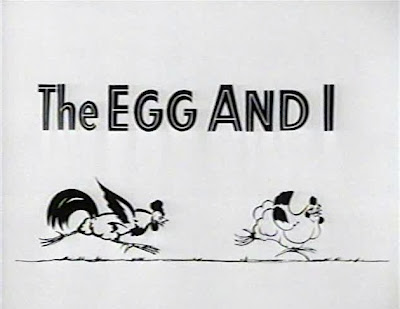The Egg and I

I never know how much the received notion/industrial discourse of the "hix pix" matched what non-urban audiences tended to prefer in the classical years, but from a glance The Egg and I (Universal, Chester Erskine) seems to be the kind of "hayseed comedy" that American television would specialize in during the late 1960s. The narrative follows the newly-married MacDonalds (Claudette Colbert and Fred MacMurry) as they live the city to follow Bob's dream of becoming a chicken farmer.

Its humor satirizes the city-slickers lost in the pre-industrial world of the American farm, though there are suggestions of the increased mechanization of farming, too. Hijinks ensue in what's a reverse Our Daily Bread, as the film sends up the romanticism of the back-to-farm mentality while ultimately also siding with it.
The film also introduced the characters of Ma and Pa Kettle, whose popularity spawned a series at Universal. (Despite their status as secondary characters, they are featured prominently in some video cover art.) Stereotypical hillbillies, the Kettles and their fifteen children provide the other target of humor, of the rural from the viewing position of those who have become more urbanized.
There are also two Native American farm hands, whom Betty MacDonald confuses with marauding Indians, after Hollywood Westerns.
 Her naivete is the butt of the joke, but of course these are movie Indians. Stereotype aside, the incident gives a good window into the comedic style of the film, which in the style of a Bob Hope film progresses from one self-conscious joke to another. The soundtrack comments comedically on the action, and characters show both awareness (Bob chides, "You've been watching too many movies") and lack of awareness (the Indians seem unaware that Betty's reaction is racist hysteria).
Her naivete is the butt of the joke, but of course these are movie Indians. Stereotype aside, the incident gives a good window into the comedic style of the film, which in the style of a Bob Hope film progresses from one self-conscious joke to another. The soundtrack comments comedically on the action, and characters show both awareness (Bob chides, "You've been watching too many movies") and lack of awareness (the Indians seem unaware that Betty's reaction is racist hysteria). There are other self-conscious touches too, like the POV tracking shot from the vantage of an imaginary person (after the film treats schizophrenia as a gag):
The film, unusually, does not open with the credit title but rather a preamble (again, with gratuitous racial stereotyping) ending in direct address to the spectator.
 David Bordwell has maintained in Classical Hollywood Cinema that such moments of self-conscious address were frequent for comedies. Interestingly, though, I have yet to come across many examples in 1947. Perhaps the studios I have watched more extensively - MGM, Fox, WB, and RKO - were the ones least likely to adopt such tongue-in-cheek rapport with the spectator. I look forward to seeing more from Universal, Paramount, and Columbia.
David Bordwell has maintained in Classical Hollywood Cinema that such moments of self-conscious address were frequent for comedies. Interestingly, though, I have yet to come across many examples in 1947. Perhaps the studios I have watched more extensively - MGM, Fox, WB, and RKO - were the ones least likely to adopt such tongue-in-cheek rapport with the spectator. I look forward to seeing more from Universal, Paramount, and Columbia.
Comments